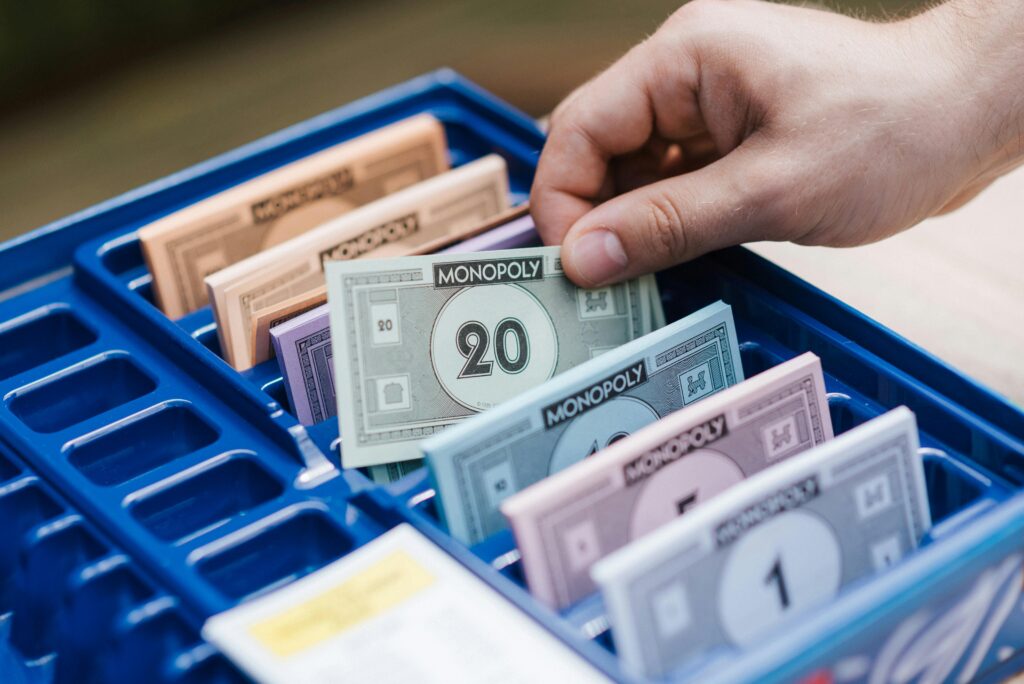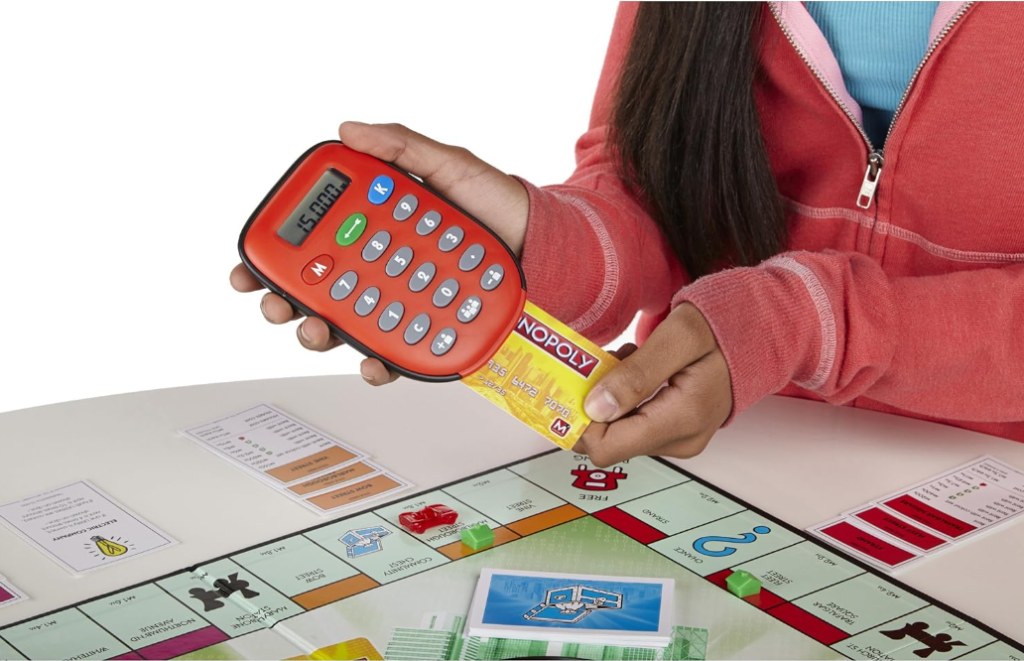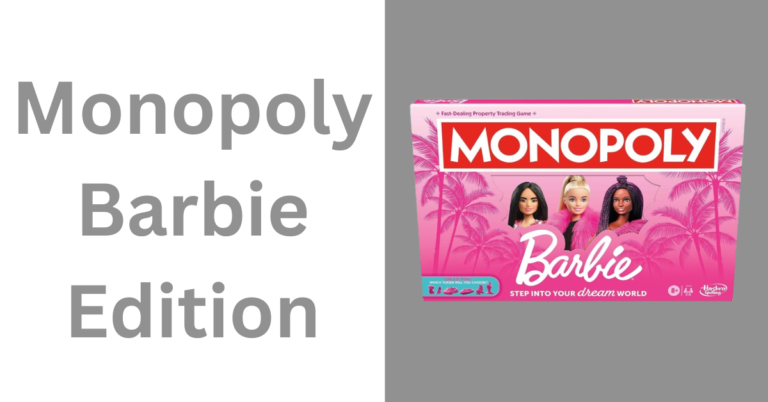Monopoly Money Distribution Rules – Money Management
At the start of the Monopoly game, each player receives a total of $1,500 in Monopoly money. The $1500 in cash is divided as follows: two each of $500’s, $100’s, and $50’s; six $20’s; five each of $10’s, $5’s, and $1’s. This amount is designed to provide a solid financial foundation, allowing players to invest in properties, pay rent, and maneuver through the various twists and turns the game throws at them. The money is distributed in specific denominations to facilitate easy transactions and strategic planning.

Distributing Initial Funds: Getting Players Started
The Standard Distribution: How Much Each Player Gets?
At the commencement of Monopoly, each participant is endowed with a total of $1,500. This sum is allocated in specific denominations to facilitate smooth transactions and strategic gameplay. Each player receives:
- Two $500 bills
- Four $100 bills
- One $50 bill
- One $20 bill
- Two $10 bills
- One $5 bill
- Five $1 bills
The substantial $500 bills are perfect for acquiring prime real estate early in the game, while the smaller denominations ensure players can pay fines, and rent, and make exact payments when needed. This initial capital is crucial for players to start building their financial empires and navigating the complex web of deals, trades, and developments Monopoly demands.
Custom Variations: House Rules for Initial Money
While the standard distribution is well-balanced for a typical game, many players and families introduce house rules to spice things up. Custom variations can include starting with a different amount of money or altering the denominations given.
Some house rules might double the starting funds, giving each player $3,000 instead of the usual $1,500, leading to faster-paced games with more significant investments and bolder strategies.

Monopoly Money Denominations: Breaking Down the Bills
The Different Bill Sizes: From One to Five Hundreds
Monopoly money comes in various denominations, each serving a specific purpose within the game. The bills are divided into seven different sizes:
- $1 Bills: These are the smallest denominations and are often used for minor transactions, fines, or making precise changes.
- $5 Bills: Slightly larger than the $1 bills, these are useful for small purchases and fees.
- $10 Bills: These bills often come into play for medium-sized transactions and can be handy for paying rent on cheaper properties.
- $20 Bills: Serving as a bridge between the smaller and larger denominations, $20 bills are frequently used in a variety of transactions.
- $50 Bills: These are the go-to for more significant payments and property acquisitions.
- $100 Bills: Essential for high-value transactions, including purchasing houses and hotels.
- $500 Bills: The largest denomination, these bills are crucial for major investments and can quickly change the financial landscape of the game.
Having a mix of these bills ensures players can handle all types of transactions, from the smallest fines to the largest property deals, making the game flow smoothly.
Visual Guide: Recognizing Each Denomination
Recognizing and differentiating between the Monopoly money denominations is vital for quick and efficient gameplay. Each denomination is color-coded, which helps players easily identify the value of each bill at a glance:
- $1 Bill: Traditionally white, these bills are the easiest to spot and often accumulate in large quantities.
- $5 Bill: Pink in color, they stand out with their unique shade.
- $10 Bill: Yellow bills, bright and hard to miss.
- $20 Bill: A striking green, similar to actual US currency.
- $50 Bill: Blue, providing a clear distinction from the other denominations.
- $100 Bill: A bold, peach color that is instantly recognizable.
- $500 Bill: An orange-red hue, signifying its high value and importance in major transactions.
This visual system not only makes the game more enjoyable but also ensures that players can quickly and accurately manage their money, keeping the gameplay dynamic and engaging.

Money Management Tips: Playing the Banker
Keeping Track of the Bank’s Funds: Tips and Tricks
Maintaining the integrity of the game as a banker involves organizing money into neat stacks by denomination and using a dedicated space or tray for easy access. Keep a running tally of the bank’s funds using a notepad or spreadsheet, recording each transaction to prevent errors and identify discrepancies. Periodically count the bank’s money, especially after major transactions, and allocate specific areas for different types of transactions to reduce confusion and expedite the banking process.
Handling Large Transactions: Making Change Efficiently
Making change efficiently is a crucial skill for any Monopoly banker. When a player hands you a large bill, such as a $500 note, you need to be prepared to provide the correct change swiftly. Ensure you have an ample supply of smaller denominations readily available.
Income Sources: How Players Earn Monopoly Money
Passing Go: The Regular $200 Payday
In the world of Monopoly, few moments are as gratifying as crossing that iconic “Go” space. It’s a dependable and reassuring source of income, offering players a steady $200 payday every time they make a full circuit around the board. This reward is the lifeblood of a player’s financial health, a consistent influx of cash that can be the difference between acquiring new properties or just barely scraping by.

Chance and Community Chest Cards: Unexpected Windfalls
Monopoly’s Chance and Community Chest cards epitomize the game’s unpredictability, serving as wildcards that can either provide unexpected financial windfalls or impose unforeseen expenses. Drawing a “Bank error in your favor” card can instantly boost your funds, while a “Doctor’s fees” card can just as quickly drain them.
Property Income: Rent, Hotels, and Houses
The heart of Monopoly’s financial success lies in property income, where strategic planning, negotiation skills, and luck converge to create wealth. Owning properties ensures a steady income stream through rent, with earnings increasing significantly as properties are developed with houses and hotels. These developments turn properties into major income sources, capable of bankrupting opponents who land on them.
Expenses in Monopoly: Where Your Money Goes
In Monopoly, managing expenses is as vital as accumulating wealth. Major costs include property purchases and upgrades, which, while strategic for future income, require significant initial investment. Paying rent on other players’ properties can deplete cash reserves quickly, especially if they are heavily developed. Additional financial drains come from fines and fees such as Luxury Tax, Income Tax, and Jail-related costs.

Common Mistakes and How to Avoid Them
Monopoly is a game of strategy, luck, and a keen eye for detail. While navigating the twists and turns of the board, players often stumble upon common pitfalls that can derail their path to victory. Understanding these mistakes and learning how to avoid them can significantly enhance your gameplay and lead to more triumphant outcomes.
Miscounting Money: Staying Accurate
One of the most fundamental aspects of Monopoly is managing your money accurately. Miscounting your cash can lead to disastrous consequences, from overspending on properties to underestimating the amount needed to pay rent or fines. This mistake is more common than you might think, especially in the heat of an intense game. To stay accurate, always double-check your money when making transactions.
Overlooking Transactions: Keeping a Close Eye
In the heat of the game, it’s easy to overlook transactions. This could be as simple as forgetting to collect rent when another player lands on your property or failing to pay a fee when required. Overlooking these transactions disrupts the game’s balance and can lead to disputes.
Bank Errors: How to Correct Mistakes
Bank errors occur when players are acting as the banker or when there’s confusion over complex transactions like mortgages and property trades. Bank errors can disrupt the game and lead to significant financial discrepancies.
To correct mistakes, first, acknowledge them as soon as they are noticed. Whether it’s a miscalculation or an accidental overpayment, addressing errors promptly prevents further complications. If a player receives too much money, they should return the excess to the bank. Conversely, if a player is shortchanged, the banker should immediately rectify the error.
FAQs
How much money does each player get at the start of Monopoly?
At the beginning of a Monopoly game, each player receives a total of $1,500, distributed as follows: 2 x $500 bills, 4 x $100 bills, 1 x $50 bill, 1 x $20 bill, 2 x $10 bills, 1 x $5 bill, and 5 x $1 bills. This initial distribution ensures that players have a balanced mix of denominations to facilitate transactions and strategic play right from the start.
What happens if the bank runs out of money during the game?
If the bank runs out of money, players can issue “bank notes” on ordinary paper or substitute any other tokens to keep the game going. The bank never goes bankrupt. Alternatively, you can use additional Monopoly money from another set if available. The key is to ensure that the game continues smoothly and all players have the opportunity to engage in transactions as needed.
Can players lend or give money to each other during the game?
In the official rules of Monopoly, players cannot lend money to each other. However, players can make trades involving money, properties, and Get Out of Jail Free cards. All transactions should be mutually agreed upon and conducted in good faith. This rule helps maintain the competitive nature of the game while allowing for strategic negotiations and alliances.
How are fines and fees handled in Monopoly?
Fines and fees, such as those from Chance and Community Chest cards or landing on Income Tax or Luxury Tax spaces, are paid directly to the bank. For example, if you land on the Income Tax space, you must pay either $200 or 10% of your total worth to the bank. If you land on the Luxury Tax space, you pay $75 to the bank.
Conclusion
The initial allocation of $1,500 to each player, carefully divided into various denominations, sets the stage for strategic decision-making and competitive play. Clear guidelines on handling fines, fees, and transactions ensure that the game progresses smoothly without disputes. Whether managing finances, negotiating trades, or calculating rent, these rules underpin the game’s dynamic economy, emphasizing the importance of financial acumen and strategic foresight.






